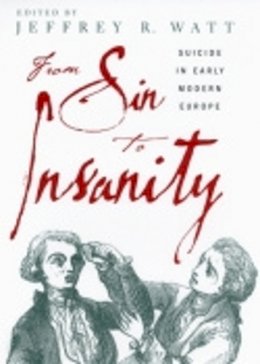
From Sin to Insanity
Jeffrey R. . Ed(S): Watt
In the broadest treatment yet of suicide in Europe during the period 1500–1800, 11 authors combine elements of social, cultural, legal, and intellectual history to trace important changes in the ways Europeans experienced and understood voluntary death. Well into the seventeenth century, Europeans viewed suicide as a terrible crime and an unforgivable sin resulting from demonic temptation. By the late eighteenth century, however, suicide was rarely subject to judicial penalties, and society tended to blame self-inflicted death on insanity rather than on the devil.
From Sin to Insanity shows that early modern Europe witnessed nothing less than the birth of modern suicide: increasing in frequency, self-inflicted death became decriminalized, secularized, and medicalized, viewed as a regrettable but not shameful result of reversals in fortune or physical or mental infirmity. The ten chapters focus on suicide cases and attitudes toward self-murder from the fifteenth to the early nineteenth centuries in geographical settings as diverse as Scandinavia and Hungary, France and Germany, England and Switzerland, Spain and the Netherlands.
Product Details
About Jeffrey R. . Ed(S): Watt
Reviews for From Sin to Insanity
H. C. Erik Midelfort, University of Virginia, author of A History of Madness in Sixteenth-Century Germany "Suicide—once seen as a dreadful act of despair or, less commonly, a heroic sacrifice—remains the subject of intense contemporary debate. In this compelling collection of essays, Watt and his colleagues offer a deft exploration of the meaning of self-inflicted death for people of every station across preindustrial Europe. In the process, they meticulously illuminate the origins of modern perceptions and concerns."
Raymond A. Mentzer, Daniel J. Krumm Family Professor of Reformation Studies, University of Iowa "The fact that From Sin to Insanity assembles so much information in a single volume makes it unique. Up to now, anyone wishing to read up on the history of suicide in this period had to consult specialized studies targeting a single country or area. This collection makes available for the first time a comprehensive overview of attitudes toward suicide in most of Western Europe, at a pivotal time in history."
Carlos M. N. Eire, Yale University, author of From Madrid to Purgatory: The Art and Craft of Dying in Sixteenth-Century Spain
